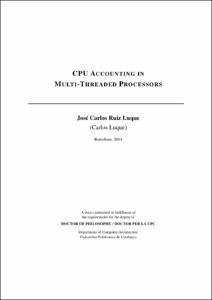Mostra el registre d'ítem simple
CPU accounting in multi-threaded processors
| dc.contributor | Cazorla Almeida, Francisco Javier |
| dc.contributor | Moretó Planas, Miquel |
| dc.contributor | Valero Cortés, Mateo |
| dc.contributor.author | Ruiz Luque, José Carlos |
| dc.contributor.other | Universitat Politècnica de Catalunya. Departament d'Arquitectura de Computadors |
| dc.date.accessioned | 2014-06-04T12:12:06Z |
| dc.date.available | 2014-06-04T12:12:06Z |
| dc.date.issued | 2014-05-29 |
| dc.identifier.citation | Ruiz Luque, J.C. CPU accounting in multi-threaded processors. Tesi doctoral, UPC, Departament d'Arquitectura de Computadors, 2014. DOI 10.5821/dissertation-2117-95291. |
| dc.identifier.uri | http://hdl.handle.net/2117/95291 |
| dc.description.abstract | In recent years, multi-threaded processors have become more and more popular in industry in order to increase the system aggregated performance and per-application performance, overcoming the limitations imposed by the limited instruction-level parallelism, and by power and thermal constraints. Multi-threaded processors are widely used in servers, desktop computers, lap-tops, and mobile devices. However, multi-threaded processors introduce complexities when accounting CPU (computation) capacity (CPU accounting), since the CPU capacity accounted to an application not only depends upon the time that the application is scheduled onto a CPU, but also on the amount of hardware resources it receives during that period. And given that in a multi-threaded processor hardware resources are dynamically shared between applications, the CPU capacity accounted to an application in a multi-threaded processor depends upon the workload in which it executes. This is inconvenient because the CPU accounting of the same application with the same input data set may be accounted significantly different depending upon the workload in which it executes. Deploying systems with accurate CPU accounting mechanisms is necessary to increase fairness among running applications. Moreover, it will allow users to be fairly charged on a shared data center, facilitating server consolidation in future systems. This Thesis analyses the concepts of CPU capacity and CPU accounting for multi-threaded processors. In this study, we demonstrate that current CPU accounting mechanisms are not as accurate as they should be in multi-threaded processors. For this reason, we present two novel CPU accounting mechanisms that improve the accuracy in measuring the CPU capacity for multi-threaded processors with low hardware overhead. We focus our attention on several current multi-threaded processors, including chip multiprocessors and simultaneous multithreading processors. Finally, we analyse the impact of shared resources in multi-threaded processors in operating system CPU scheduler and we propose several schedulers that improve the knowledge of shared hardware resources at the software level. |
| dc.format.extent | 155 p. |
| dc.language.iso | eng |
| dc.publisher | Universitat Politècnica de Catalunya |
| dc.rights | L'accés als continguts d'aquesta tesi queda condicionat a l'acceptació de les condicions d'ús establertes per la següent llicència Creative Commons: http://creativecommons.org/licenses/by/3.0/es/ |
| dc.rights.uri | http://creativecommons.org/licenses/by/3.0/es/ |
| dc.source | TDX (Tesis Doctorals en Xarxa) |
| dc.subject | Àrees temàtiques de la UPC::Informàtica |
| dc.title | CPU accounting in multi-threaded processors |
| dc.type | Doctoral thesis |
| dc.subject.lemac | Multiprocessadors |
| dc.identifier.doi | 10.5821/dissertation-2117-95291 |
| dc.identifier.dl | B 15959-2014 |
| dc.rights.access | Open Access |
| dc.description.version | Postprint (published version) |
| dc.identifier.tdx | http://hdl.handle.net/10803/144565 |
Fitxers d'aquest items
Aquest ítem apareix a les col·leccions següents
-
Departament d'Arquitectura de Computadors [360]
-
Totes les tesis [5.446]


